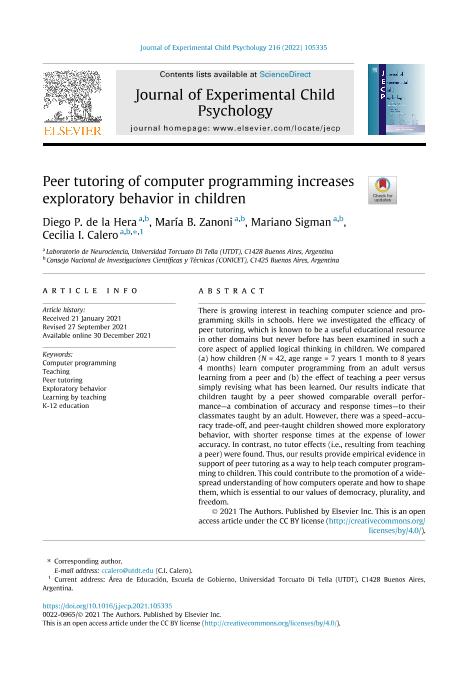Mostrar el registro sencillo del ítem
dc.contributor.author
de la Hera, Diego Pablo

dc.contributor.author
Zanoni Saad, María Belén

dc.contributor.author
Sigman, Mariano

dc.contributor.author
Calero, Cecilia Ines

dc.date.available
2023-06-16T16:58:01Z
dc.date.issued
2022-04
dc.identifier.citation
de la Hera, Diego Pablo; Zanoni Saad, María Belén; Sigman, Mariano; Calero, Cecilia Ines; Peer tutoring of computer programming increases exploratory behavior in children; Elsevier; Journal of Experimental Child Psychology; 216; 4-2022; 1-18
dc.identifier.issn
0022-0965
dc.identifier.uri
http://hdl.handle.net/11336/200851
dc.description.abstract
There is growing interest in teaching computer science and programming skills in schools. Here we investigated the efficacy of peer tutoring, which is known to be a useful educational resource in other domains but never before has been examined in such a core aspect of applied logical thinking in children. We compared (a) how children (N = 42, age range = 7 years 1 month to 8 years 4 months) learn computer programming from an adult versus learning from a peer and (b) the effect of teaching a peer versus simply revising what has been learned. Our results indicate that children taught by a peer showed comparable overall performance—a combination of accuracy and response times—to their classmates taught by an adult. However, there was a speed–accuracy trade-off, and peer-taught children showed more exploratory behavior, with shorter response times at the expense of lower accuracy. In contrast, no tutor effects (i.e., resulting from teaching a peer) were found. Thus, our results provide empirical evidence in support of peer tutoring as a way to help teach computer programming to children. This could contribute to the promotion of a widespread understanding of how computers operate and how to shape them, which is essential to our values of democracy, plurality, and freedom.
dc.format
application/pdf
dc.language.iso
eng
dc.publisher
Elsevier

dc.rights
info:eu-repo/semantics/openAccess
dc.rights.uri
https://creativecommons.org/licenses/by/2.5/ar/
dc.subject
COMPUTER PROGRAMMING
dc.subject
EXPLORATORY BEHAVIOR
dc.subject
K-12 EDUCATION
dc.subject
LEARNING BY TEACHING
dc.subject
PEER TUTORING
dc.subject
TEACHING
dc.subject.classification
Otras Psicología

dc.subject.classification
Psicología

dc.subject.classification
CIENCIAS SOCIALES

dc.title
Peer tutoring of computer programming increases exploratory behavior in children
dc.type
info:eu-repo/semantics/article
dc.type
info:ar-repo/semantics/artículo
dc.type
info:eu-repo/semantics/publishedVersion
dc.date.updated
2023-06-12T17:33:20Z
dc.journal.volume
216
dc.journal.pagination
1-18
dc.journal.pais
Países Bajos

dc.description.fil
Fil: de la Hera, Diego Pablo. Universidad Torcuato Di Tella; Argentina. Consejo Nacional de Investigaciones Científicas y Técnicas; Argentina
dc.description.fil
Fil: Zanoni Saad, María Belén. Universidad Torcuato Di Tella; Argentina. Consejo Nacional de Investigaciones Científicas y Técnicas; Argentina
dc.description.fil
Fil: Sigman, Mariano. Universidad Torcuato Di Tella; Argentina. Consejo Nacional de Investigaciones Científicas y Técnicas; Argentina
dc.description.fil
Fil: Calero, Cecilia Ines. Universidad Torcuato Di Tella; Argentina. Consejo Nacional de Investigaciones Científicas y Técnicas; Argentina
dc.journal.title
Journal of Experimental Child Psychology
dc.relation.alternativeid
info:eu-repo/semantics/altIdentifier/url/https://linkinghub.elsevier.com/retrieve/pii/S0022096521002538
dc.relation.alternativeid
info:eu-repo/semantics/altIdentifier/doi/http://dx.doi.org/10.1016/j.jecp.2021.105335
Archivos asociados
